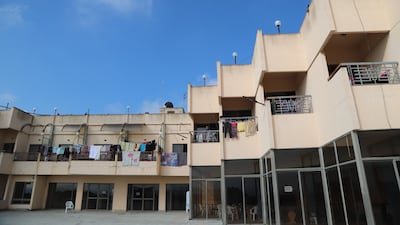Live updates: Follow the latest on Israel-Gaza
Like most of the residents at the Hotel Montana in southern Lebanon, Ali Hammoud is counting the days until he can leave.
Dozens of families live at the hotel in Marwanieh, a village about halfway between the cities of Saida and Nabatieh, after being forced to flee their homes near the southern border with Israel because of an escalating conflict there that began in October.
Mr Hammoud describes the monotonous routine of their days as they wait for the fighting to end, a hope that is fast fading as the exchange of attacks between the militant group Hezbollah in Lebanon and the Israeli army grow only more intense.
Typically mornings start with a coffee, but after that there is little else to do. “Sometimes in the afternoons if we are feeling a bit better about the situation we might have a game of football,” he says.
“And maybe at night someone might break out a deck and play cards, but basically there’s nothing to do.”
After five months away from their home in the village of Rab Al Thalathine, Mr Hammoud, a barber by trade, says he worries about the effect the forced displacement is having on his family.
He lowers his head and becomes emotional. “My oldest son has had a mental breakdown three times,” says the father of three children, who are 17, 13 and 11.
“I’m really scared about the impact on my kids, on their social life, no academic life. I’m really worried they will be stunted by this year.”

According to the International Organisation for Migration, about 90,000 people have been displaced since the near daily cross-border attacks began on October 8, a day after Israel launched a devastating military offensive in Gaza against Hamas, a Hezbollah ally.
They have been provided with free board and assistance from NGOs, but the uncertainty of their situation is taking its toll. Doctors Without Borders (MSF) has reported seeing an increase in anxiety disorders and depression among the displaced people.
Initially they were hopeful they could return home soon, says Dr Aida Hassouni of the MSF, which provides health care for the displaced, including mental health counselling.
“Now more than four months have passed, and their needs are increasing, whether in terms of health, social, economic or psychological,” Dr Hassouni says.
“They are in a confined, stagnant place where they cannot organise activities or lead their usual daily lives. Their mental state has begun to deteriorate, especially as they deal with uncertain conditions and ambiguous circumstances."

Their surroundings at the Hotel Montana, with its the large – but now empty – outdoor swimming pool, tall ceilings and marble flooring, speak of better days. Abandoned in 2005, it was reopened to accommodate more than 65 displaced families, says Salam Badreddine, the head of the disaster management committee for the Saida-Zahrani area. He says there is one family to each unit, so they are able to retain some dignity.
“The men, for example, they've been here four or five months not being able to be productive and work. That's causing a lot of stress; they feel useless, cooped up.
“There's no TV, no recreational activities. It's taking a toll on the people here – five months with no clear end in sight.”
Mr Badreddine says the stress they feel is largely related to their forced displacement and the war in Gaza, where more than 30,700 people have been killed.
The children do their schooling online but the weak internet connection makes studying a constant battle.
“Everything here is online classes, but the internet is almost non existent. There’s almost no point really,” Mr Hammoud says.
Manahel, a widow from the border village of Odaisseh, says her family is completely separated, with her daughter studying for a masters degree in Beirut and her son elsewhere.
“Mentally it’s been a lot for me to take on, because it’s so difficult to be outside your own home, far from your own land,” she said.
“I have been a widow for eight years and I’ve only just got out of the trauma of losing my husband, and now war is upon us.”
For Mr Hammoud, the biggest problem is keeping his family warm. The family left their home in a hurry in October, when the weather was still warm, and took only limited supplies. They have a heater but cannot afford the gas.
For the first two months of the war they lived in Beirut but then ran out of money, after which they came to the displacement centre.
“My patience and ability to cope ran out a long time ago,” Mr Hammoud says.
“But the thing is there is no alternative, there is no place to be. If someone had a magic lantern and was able to send us back to our towns, we’d go right now.”


